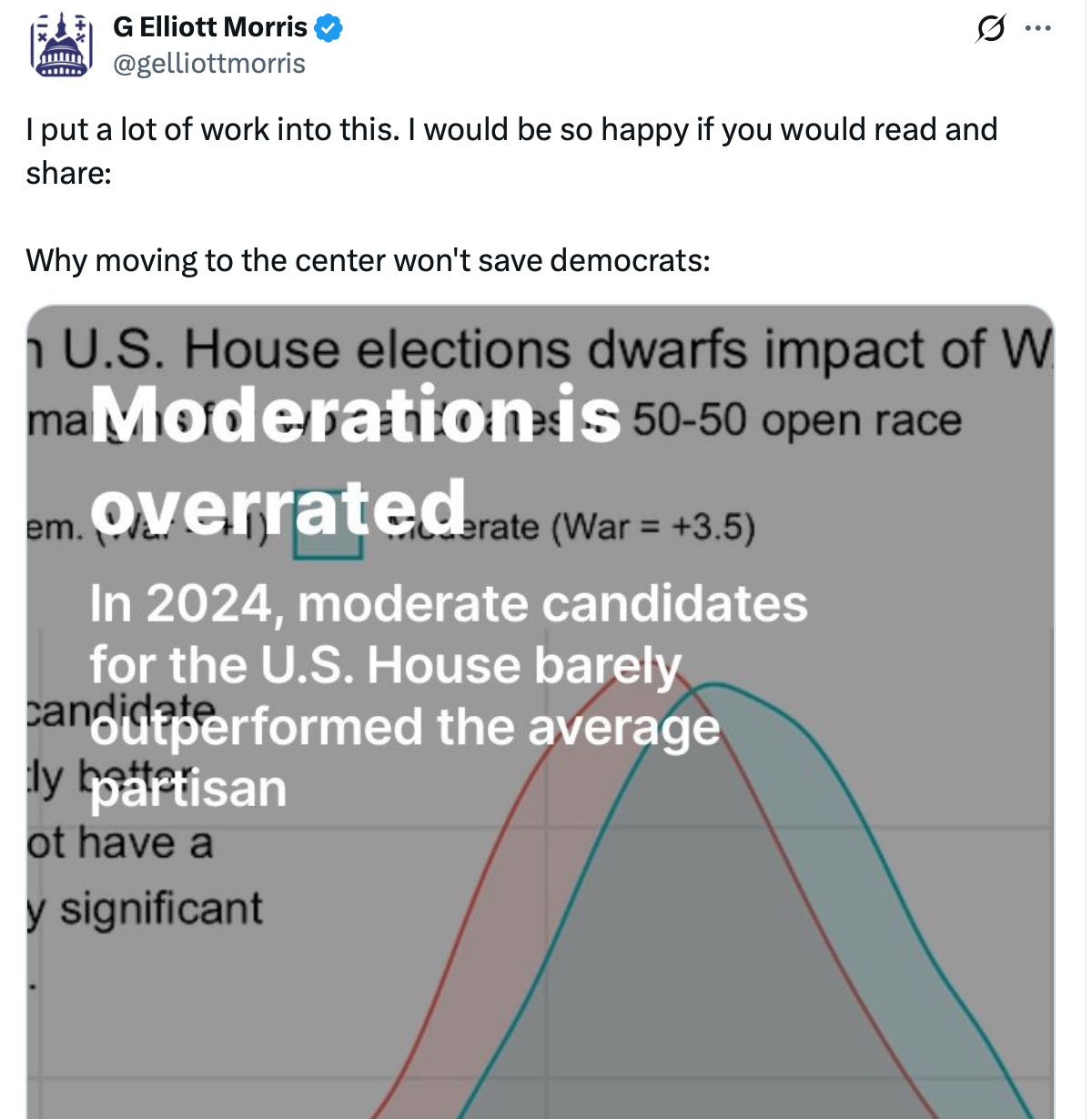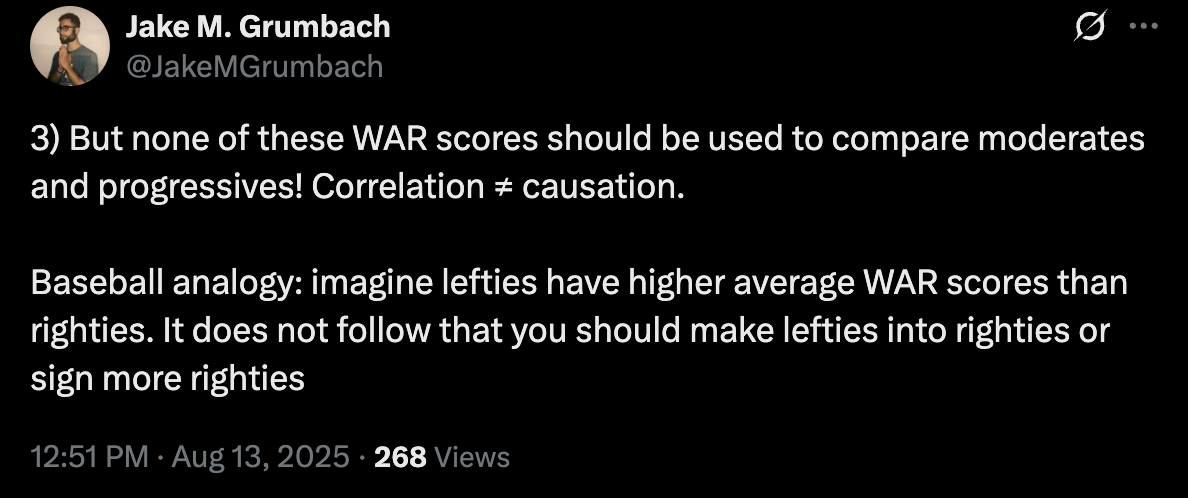G. Elliott Morris has a much-discussed follow-up to his WAR model titled “Moderation is not a silver bullet.”
Which, fair enough!
The piece’s URL and title on social media is punchier: “Moderation is overrated” with the tagline “Why moving to the center won’t save Democrats”:
Moderate Bonus Agreement
The piece is worth a full read (here) because - like the different titles of the piece - there are a few different angles to it.
One thing everyone seems to agree on is that moderates do better than progressives, Morris included. Here’s how he categorizes moderate over-performance as insubstantial:
Note the difference between the words “substantial,” as in, the real-world meaning we can attach to something, and “significant,” as in “statistically significant.” Things can be significant but non-subtantial. The link between ideological moderation and WAR is one of those things.
The question is not “do moderates do better?” The idea moderates do better - let’s call it the Moderate Bonus - seems settled. So the questions are all relative:
across time (what is the Moderate Bonus in 2026 vs. 2006?)
against other factors (is it as important as overall party favorability?)
and in absolute value (hey, is 2 points really that big of a deal?).
Here’s the argument on the first, the decline of the Moderate Bonus over time:
the premium on ideological moderation has declined substantially over time. In 2000, for example, we would have predicted a candidate with the same moderate ideological score as Jared Golden to have a WAR of +11.7, and an extremist (at the Ilhan Omar ideal point) to score +5. That's a 7-point spread, compared to 1.4 points today.
In other words, the advantage of being a moderate has fallen by 80% since the turn of the century.
My inclination is all on one side of these questions … but they are fair questions for debate.
And debates about WAR are good!
Anything to focus on candidate quality and the winnability of stretch districts and the clarity of a Moderate Bonus. If the intra-party debate revolves around “sure, Jared Golden and Joe Manchin are far more electable than the Squad but the gap used to be much, much wider” then we are in a much better place than in 2020.
Is Moderation Overrated?
Morris states “I don’t think moderation is worthless, I just think it’s overrated.”
Everyone has different experiences in our fractured information environment. My experience has not been that the value of moderation is widely accepted, much less overrated … but hey, that’s why it is better to organize than just debate.
Who are moderates, anyway?
In addition to the questions of how big of a deal the Moderate Bonus is, a new layer of debate has opened: are the candidates that everyone refers to as “moderate” actually something else?
While arguing that moderation is overrated, Morris’s model says the six most valuable candidates are those most associated with moderation on both sides of the aisle: Valadao, Lawler, Golden, Cuellar, Fitzpatrick, and Bacon.
When I pointed this out on social media, Morris responded by echoing part of his piece: “Cherry-picking representatives that you identify, for other reasons, as “moderate” dramatically overstates the electoral benefit of actual empirical moderation.”
As Matthew Yglesias notes, this looks like a WelcomeFest critique.
So … are centrist advocates overstating the case? Morris emphasizes the dispersion of election outcomes (something we have long touted!) in a provocative analysis and overall gives us several interesting things to think about.
But another new WAR voice just leaves us shaking our heads.
“Unfounded nihilism” and Correlation vs. Causation
While the Morris WAR model can lead to productive conversation, a third WAR jumped off the top rope earlier this afternoon. The Stanford & Berkeley professors who did the “moderation doesn’t work if you use our new formula, we just need progressives to fight harder” paper announced they were coming out with their own version of WAR.
As all rigorous academics do, they started by … taking a shot at a peer model.
As Charlotte Swasey notes, point #3 is …
This is just silly. "looking at the shared characteristics that correlate with high performance" is an entirely valid form of analysis in both politics and baseball. You always need more work to determine causality, but as far as searching for indicators, it makes sense.
The upshot is these guys built a model to show which candidates over-perform, but it can only be used in an ideology-agnostic way because …
In the professor’s telling, moderates in politics are like lefties in baseball: they do better, but you should not want more of them.
It turns out that while 11% of the population is left-handed, 25% of Major League Baseball pitchers and 30% of batters are left-handed. It is such an advantage, you read stuff like this:
Houston’s Yordan Alvarez might be the top left-handed hitter in Major League Baseball. Teammate Framber Valdez ranks among the best left-handed pitchers, too.
Other than that, those guys are all right.
Literally — neither player considers himself left-handed at all.
MLB and its history are dotted with men who played out of their natural handedness, a phenomenon that is seen occasionally in other sports but is a regular occurrence on the diamond. Thumb through a pack of baseball cards from just about any era and you’re likely to see players who bat one way and throw the other. Ask them to sign that card and there’s no telling which hand would hold the pen.
As David Shor notes, Grumbach is putting out “unfounded nihilism”. Also, lefties hit about thirty points better against righties.
Morris closes with basically the opposite of Grumbach’s point:
What these comparisons suggest is that there is something about "moderates" that helps them, but is not well captured by empirical metrics. That would be consistent with the political science literature on moderate voters, which finds that people with inconsistent views across issues tend to reward moderate candidates. I'd theorize that the politicians that people are calling "moderates" use similar tactics — well-placed heterodox positions that fit their district — to establish reputations as ideological moderates.
One post promoted by Morris sums this up: “It seems what this boils down to is that candidate/district fit is much, much more valuable than some abstract idea of "moderation."“
This is a happy place to land. People who don’t want moderation can take the Grumbach route of denialism and nihilism, or the Morris route. The latter lands us back where Welcome started: supporting candidates who reflect their districts, with the courage and communication skills to take positions authentic to themselves and differentiated from their party brand. Call it what you wanna call it … there’s 908 days until the next presidential primary and this is the latest the newsletter has gone out in the past 93 days! More WAR to come tomorrow, surely.






That analogy falls into the "tell me you don't follow sportsball without telling me you don't follow sportsball" bucket.
A moderate is someone not wedded to an ideology. Progressives are wedded to some form of collectivist philosophy. They aren't sufficiently practical to develop truly effective tactics to achieve the mythical civilization they dream of. A moderate is willing to consider scientific evidence from sociobiology that enriches our understanding of the genetic contribution to human behavior, as it relates to living in a civilized world. This evidence indicates, as E.O. Wilson has described it, that we are ALL subject, to varying degrees, to survival impulses from our Paleolithic genes. His analysis leads to the conclusion that becoming truly civilized involves working hard to channel these impulses constructively. Passing laws that dictate in detail how we must act merely activates the genes in question that interpret the laws as attacks on individual freedom. Part of the job of parenting, is training children to value working to become civilized.